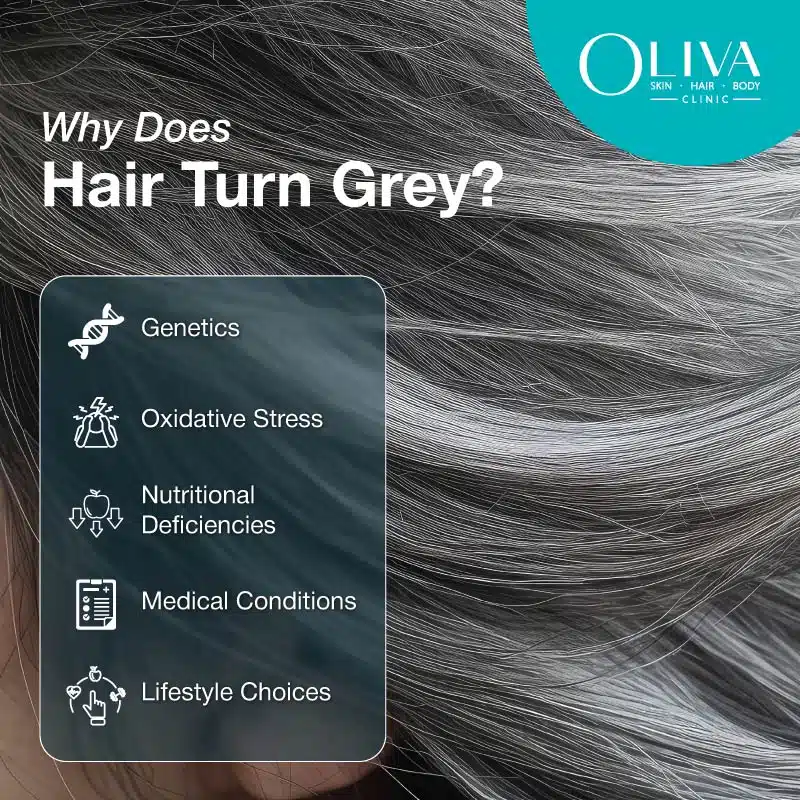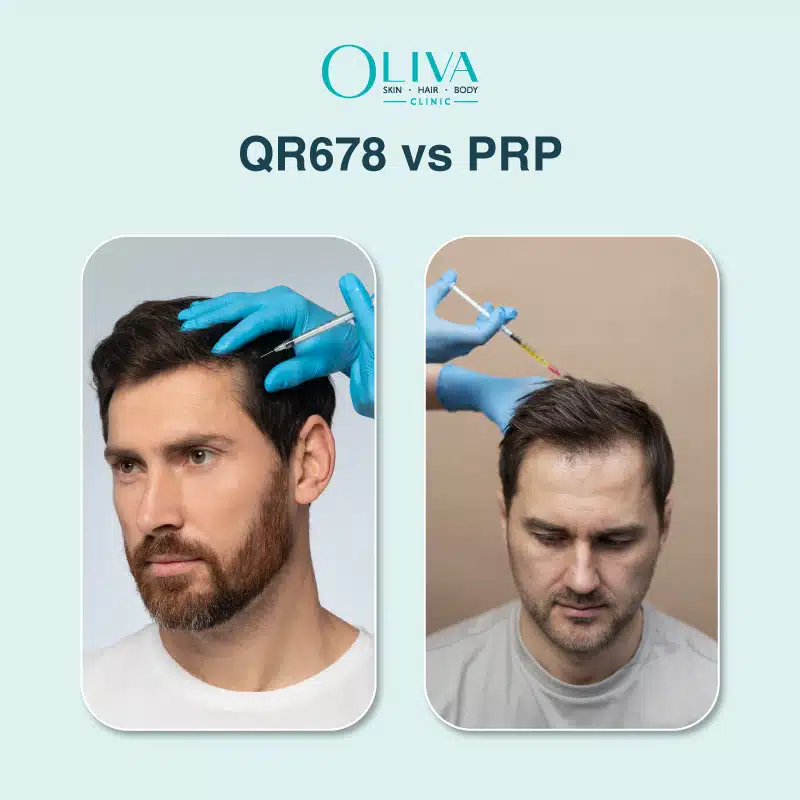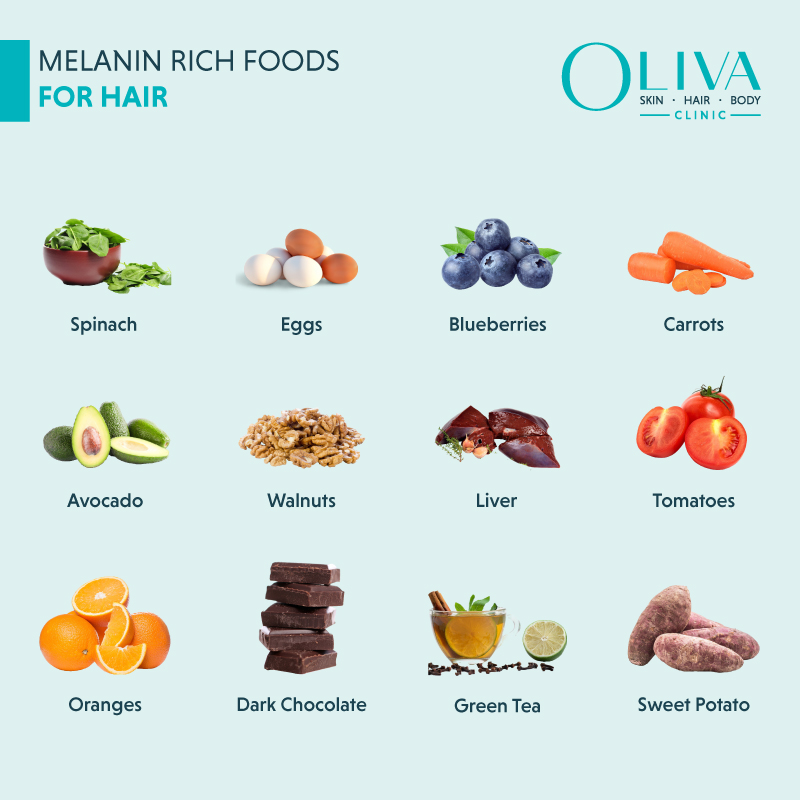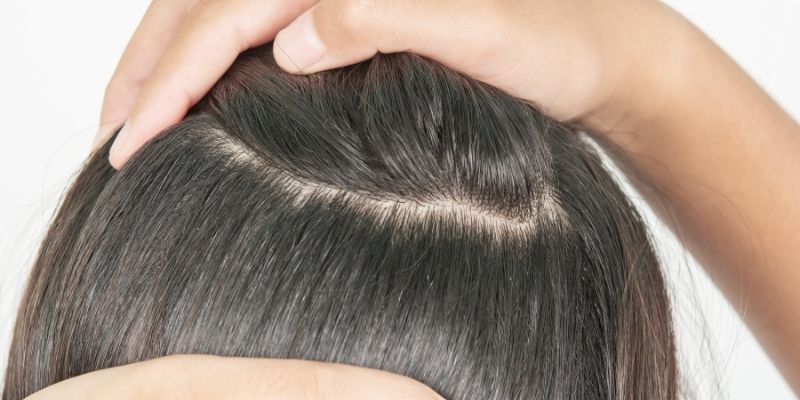In This Article
Top Reasons for Gray Hair: What Causes Hair Color Loss?
Grey hair is something most of us would prefer not to embrace unless it is a trend. Let’s admit it; nobody wants to look older than their age. While grey hair comes naturally with ageing, several other factors influence greying in both men and women. In this article, we will learn about the reasons for grey hair and discuss how to reverse greying. In addition, we will debunk some myths about grey hair and present you with the facts to help you stay informed about any misinformation that may come your way.
In This Article

What Are The Main Reasons For Hair Going Grey?
Hair turning grey at a young age could be caused by many reasons. Here is a breakdown of the reasons for grey hair:
-
Ageing and Melanin Decline:
We all know that grey hair is primarily caused by the natural ageing [1] process. As we age, the melanin-producing cells in our hair follicles become inactive or die. This decrease in pigment cell production makes the new hair strands grow without any pigment. As a result, they appear as white, grey or silver hair.
-
Genetics:
Your genes could be another reason for grey hair. If you have a family history [2] of premature greying, you are at a higher risk of developing it.
-
Stress:
Chronic stress [3] is a contributing factor to hair greying. When you are subject to psychological or emotional stress, it affects the stem cells producing melanin pigment. This further leads to premature greying of hair.
-
Nutritional Deficiencies:
One of the significant reasons for premature greying of hair is the lack of certain vitamins, minerals and essential nutrients [4] . Deficiency in vitamin B12, B6, zinc, iron and folate can cause white hair at an early age.
-
Medical Conditions:
Autoimmune diseases, like alopecia and vitiligo, can cause your hair to turn grey by targeting the pigment. Similarly, thyroid disorders [5] can also influence melanin production, eventually leading to premature greying.
-
Lifestyle Choices:
Unhealthy lifestyle habits like smoking [6] can cause your hair to turn grey early.
Debunking Common Myths About Grey Hair
Here are five common myths about grey hair. We are debunking them for you so that you will stop believing them.
- Myth: Plucking one grey hair causes more grey hair to grow.
- Fact: Pulling out one grey hair will not grow more grey hair. It is incorrect. Removing your hair from the follicle has nothing to do with affecting the surrounding hairs.
- Myth: Stress causes grey hair
- Fact: Stress can be a contributing factor to premature ageing. It can influence the process of greying, but does not directly cause your hair to turn white overnight.
- Myth: Ageing causes grey hair
- Fact: While it is true that grey hair is one of the primary signs of ageing, limiting grey hair to ageing is not right. Premature greying of hair is associated with factors other than ageing alone.
- Myth: Excessive sun exposure makes your hair turn grey
- Fact: It is completely a misconception. Getting exposed to too much sun can accelerate skin ageing and damage your hair. It can contribute to premature ageing of hair by increasing oxidative stress, but does not cause it to lose its colour.
- Myth: Dyeing or colouring your hair causes premature greying
- Fact: It is not true. Hair dyeing does not affect the melanin production in hair follicles. It only affects the outer shaft of your hair.
When To Consult A Doctor About Grey Hair?
Now that you know the reasons for greying, you should also be aware of when to consult a doctor. Although greying is not harmful, sometimes, it can reveal concerns that need to be addressed immediately. Visit a doctor immediately when:
- When you notice premature greying of hair before the age of 35.
- When other symptoms, such as itching, redness, and inflammation on the scalp, or hair loss, accompany the greying of hair.
- When you observe sudden patches of grey hair appear on your scalp. This could be a sign of an underlying health issue.
Your doctor can identify the underlying issue, which could be a nutritional deficiency, thyroid disorders or excessive stress and prescribe a medication for the same.
Can Grey Hair Be Prevented or Reversed?
It is not possible to reverse grey hair, especially if it is caused by ageing or if it is hereditary. However, you can prevent premature greying of hair either fully or partially, provided the reasons are nutritional deficiency or an underlying medical condition. Making lifestyle changes and incorporating healthy habits like a balanced and nutritious diet, proper sleep, stress management, and less smoking (quit) can help slow down or even reverse the process of greying. Remember, early intervention may help restore your hair colour.
Takeaway
Grey hair is often seen as a symbol of wisdom, and you can embrace it as a symbol of beauty, confidence and self-acceptance. Grey hair is not that bad at all if it appears as part of your natural ageing process. However, if your hair starts greying prematurely, it is still not a serious issue unless there is an underlying medical condition. Addressing it in the early stages can help prevent or delay the process, and help you regain your natural colour. So, consult a doctor immediately if you notice sudden greying, accompanied by other symptoms. Seek expert analysis and help for personal advice.
Frequently Asked Questions On Reason For Grey Hair
No. Premature greying is not a serious concern. It is mainly caused by genetic factors or an unhealthy lifestyle. Other factors, like vitamin deficiencies or thyroid issues, can also contribute.
Not really! Noticing a few grey strands is very normal and often hereditary. You don’t have to worry about it, as it doesn’t indicate a health problem.
The best way to cover up your grey hair is by using ammonia-free hair dyes, henna, or getting a professional hair colouring done.
Greying primarily occurs when there is a decrease in melanin production in your hair follicles. You cannot entirely stop it. However, you can slow down the process with proper nutrition and care.
Your hair turns grey when the melanin-producing cells (melanocytes) in your hair follicles become inactive and reduce melanin production.
Women experience greying of hair primarily due to genetics, stress, hormonal fluctuations, nutritional deficiencies, and exposure to certain chemicals.
To delay the greying process, eat nutritious food rich in antioxidants, manage your stress, quit smoking and use herbal oils such as curry leaves or bhringraj.
Deficiency in vitamin B12, B6, zinc, iron and folate can lead to premature greying.
Check if you have lighter, silver strands near the temples or the crown of your scalp. These are usually the early signs of greying.
Early greying in your 30s is mainly due to genetics, stress, smoking, and poor diet.
It is not possible to reverse greying. However, with peptide serums, supplements, and safe colouring options, you can improve the appearance of your hair and enhance its health and overall look.








